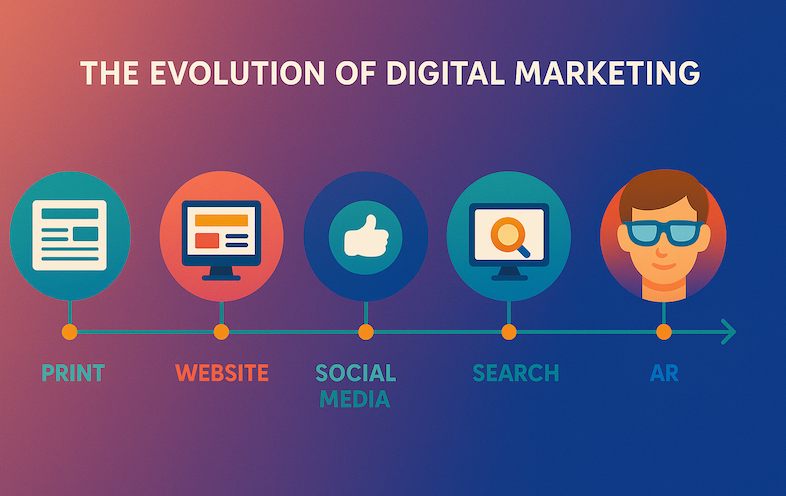Did you know that more than 60% of global marketing budgets are now flowing into digital channels in 2025? Digital marketing trends continue to evolve at a breakneck pace, reshaping how brands interact, sell, and capture new audiences. If you’re not keeping up, you’re at risk of falling behind your competitors—fast. From artificial intelligence disrupting content creation to the meteoric rise of augmented reality and video content, today’s top marketing shifts redefine the entire customer journey. This guide will arm you with the knowledge needed to capitalize on every new digital marketing trend, ensuring your business not only keeps up but stands out.

Shocking Statistics: Why Staying Updated on digital marketing trends Matters Now
The pace and scale of change in digital marketing trends cannot be overstated. Recent industry research has shown that, in 2024, over 60% of global marketing budgets are earmarked for digital activities. This shift signals a new era where successful brands must leverage top marketing innovations to maintain competitive advantage, increase brand awareness, and resonate with their target audience. As digital platforms like social media, search engines, and video content hubs boom, even small adjustments in your marketing strategy can yield remarkable changes in conversion rates and long-term growth.
The impact of not tracking evolving marketing trends is stark—businesses relying solely on outdated tactics see diminishing returns, as digital marketers who embrace innovations enjoy greater efficiency, amplified reach, and measurable ROI improvements. From the exponential rise of influencer marketing on social platforms to tighter privacy regulations that shape consumer behavior, every shift demands agile marketing strategies and a commitment to ongoing learning. Staying current is not just about survival but about unlocking new revenue opportunities and connecting with audiences in more meaningful, personalized ways.
"By 2024, over 60% of global marketing budgets are allocated to digital channels – a leap driven by rapidly evolving digital marketing trends."
Key digital marketing trends Driving Change in 2024 and Beyond
Accelerated adoption of AI across digital marketing platforms
Explosive growth in short-form video content
Heightened privacy rules impacting marketing trend analysis
Emergence of augmented reality experiences
Dominance of influencer marketing strategies
What This Guide Offers: Navigate digital marketing trends with Confidence
This comprehensive guide serves as your roadmap for success in 2024's competitive digital marketing landscape. Here, you’ll find in-depth analysis of top marketing trends impacting businesses large and small, a breakdown of the most critical digital marketing trend shifts, and actionable strategies to adapt rapidly. Explore how integrating artificial intelligence, embracing short-form video content, and prioritizing data privacy can transform your brand’s performance and visibility. Whether you’re a digital marketer, business owner, or marketing strategist, these evidence-based insights will help you excel and future-proof your approach.
In-depth analysis of top marketing trends shaping 2024
Breakdown of the most impactful digital marketing trend shifts
Practical strategies to harness emerging technology
Actionable steps for boosting brand awareness and sales
Expert answers to pressing questions in digital marketing

Decoding digital marketing trends: Evolution and Dynamic Shifts
From Traditional to Transformative: The History of digital marketing
The journey of digital marketing trends is a testament to the marketing industry's constant reinvention. Just a decade ago, marketing campaigns heavily relied on print, television, and static websites. Social platforms began disrupting the landscape by 2015, enabling unprecedented levels of brand engagement, and ushering in the era of digital marketers who relied on audience data and direct interaction. As technology advanced, marketers adopted tools for tracking real-time behavior, optimizing conversion rates, and deploying personalized digital ad campaigns, all of which paved the way for today's transformative marketing strategies.
By 2017 and beyond, video content and influencer marketing exploded, positioning social media as the top marketing hub for digital marketers seeking authentic engagement. The integration of artificial intelligence marked a new inflection point, powering customer experience personalization and efficient generated content. The present is equally exciting—augmented reality and AI tools continue revolutionizing the digital marketing trend landscape, allowing brands to experiment with immersive campaigns that foster deeper connections and measurable results.

Critical inflection points in marketing trends and their impact
Marketing trends have experienced several critical inflection points that reshaped industry paradigms. The rise of mobile-first platforms and social networks in the mid-2010s democratized content creation, allowing even micro-brands to harness top marketing channels. As digital marketers adopted tools powered by artificial intelligence, they seamlessly transitioned from campaign-centric to audience-centric approaches. This meant that strategies shifted toward personalization, user-generated content, and real-time analytics—major drivers of competitive advantage in today's market.
The rapid adoption of influencer marketing, especially on platforms like Instagram Reels, YouTube Shorts, and emerging social platforms, transformed how brands build trust and drive brand awareness. Advances in search engine optimization, driven by voice search and machine learning, have also influenced digital marketing trend priorities—pushing brands to rethink keyword strategy and make their online assets more discoverable and interactive. Each of these milestones has left a lasting mark, making it vital for digital marketers to remain agile and proactive in their strategies.
Table: The Timeline of digital marketing trend Innovations
Year |
Key digital marketing trend |
Industry Impact |
|---|---|---|
2015 |
Rise of social platforms |
Broader audience reach, new engagement models |
2017 |
Video content surge |
Higher engagement, mobile-first strategies |
2019 |
Growth of influencer marketing |
Authentic connection, micro-influencer rise |
2022 |
AI-driven personalization |
Dynamic content, enhanced ROI |
2024 |
Augmented reality in digital marketing |
Immersive user experience, interactive brand awareness |
Top digital marketing trends for 2024: Unveiling the Leading marketing trend Drivers
Artificial Intelligence: The Powerhouse of digital marketing trend Evolution
Artificial intelligence (AI) has become the cornerstone of modern digital marketing trends. Marketers are leveraging AI tools for predictive analytics that anticipate audience behavior, automate content creation, and refine targeting for higher campaign efficiency. Automated content generation enables digital marketers to create content at scale, freeing up human resources for high-level strategy while ensuring relevancy and personalization for diverse audiences. AI chatbots, another powerful digital marketing trend, engage users in real-time, provide personalized recommendations, and address queries instantly—improving customer experience and driving higher conversion rates.
Predictive analytics for targeting campaigns
Automated content generation and optimization
AI chatbots increasing real-time engagement

Video Content Dominance: Fueling Marketing Trends and Brand Awareness
Short-form video content has emerged as the fastest-growing digital marketing trend in 2024. Platforms like YouTube Shorts, Instagram Reels, and TikTok have redefined content consumption by rewarding brands that deliver engaging, bite-sized videos. Digital marketers now invest heavily in video SEO, optimizing every clip’s metadata and captions to boost discoverability in search engines. Livestream shopping and interactive content take engagement a step further, providing immersive experiences that fuel brand awareness and encourage real-time purchases.
Short-form videos on social media
Livestream shopping and interactive content
Video SEO practices for maximum impact

Influencer Marketing: Redefining Trust and Reach Across Social Platforms
Influencer marketing continues to reshape how brands harness trust and reach on today’s leading social platforms. The digital marketing trend has evolved from exclusively partnering with macro-influencers to also leveraging micro-influencers who offer hyper-targeted audience access. Studies reveal that micro-influencers yield higher engagement rates and an enhanced ROI compared to broader campaigns, due to personalized messaging and authentic product promotion. Regulatory shifts, including new transparency guidelines, further cement authenticity and trust as prerequisites for influencer partnerships.
Evolution of influencer marketing trend
Micro-influencers vs. macro-influencers: ROI comparison
Authenticity and regulatory shifts

Social Media Strategies: Harnessing Top Marketing for digital marketing trends
Social media marketing trends demand tailored strategies for each platform—what works for Facebook’s broad audience may not resonate on Gen Z-focused TikTok or visually driven Instagram. The rise of new social platforms in digital marketing means brands must remain vigilant, consistently testing and adapting their social media marketing strategies for maximum traction. Balancing paid and organic content is vital, as each offers unique strengths: paid ads provide scalability and rapid testing, while organic engagement builds trust and long-term community loyalty.
Platform-specific content tailoring
The rise of new social platforms in digital marketing
Paid vs. organic social media growth
Search Engine Innovations: Elevating digital marketing trend Impact
Voice Search and AI-Powered Search Engine Optimization (SEO)
As voice search adoption rises across devices, it's transforming how digital marketers approach content and keyword strategy. Adapting your marketing strategy for natural language queries is now essential. Implementing schema markup and focusing on semantic search help digital marketers align content with voice search intent, making it more accessible across search engines like Google and Bing. Future-proofing SEO for new marketing trends requires constant monitoring of voice-driven search dynamics and the integration of AI-powered insights to respond rapidly to shifts in consumer behavior.
Adapting your marketing strategy for voice queries
Schema markup and natural language optimization
Future-proofing SEO for new marketing trends

Augmented Reality: Engaging Consumers through digital marketing trends
Immersive Brand Experiences: AR’s Rise Within The Marketing Trend
The emergence of augmented reality (AR) marks a thrilling shift in digital marketing trends, delivering interactive and gamified brand experiences. Leading retailers and beauty brands are rolling out AR-powered virtual try-ons and product demonstrations, allowing customers to experience products in real time before purchasing. Gamification and immersive storytelling continue to elevate brand awareness, while integrated analytics provide clear data on engagement and ROI for each AR-powered campaign.
Virtual try-on and product demos
Gamification for brand awareness
Measuring ROI in AR-powered campaigns

Data Privacy and Ethical Marketing: The New digital marketing trend Imperative
Navigating Changing Regulations and Consumer Expectations
The landscape for data privacy is shifting dramatically as consumers demand transparency and control over their personal information. Global privacy regulations like GDPR and CCPA are impacting every marketing strategy, prompting digital marketers to prioritize ethical data collection and usage. Winning brands set themselves apart by leveraging zero-party and first-party data collected with explicit consent, building trust through openness about how data fuels personalized marketing campaigns. In this climate, trust has become the new currency in all digital marketing trends.
Impact of GDPR and CCPA on marketing strategy
Strategies for building trust through transparency
Leveraging zero-party and first-party data
"Trust is the new currency in digital marketing trends. Ethical practices will define the winners of tomorrow’s marketplace."

Dynamic digital marketing Strategies: Integrating New Trends for Business Success
Crafting an Agile marketing strategy to Leverage Emerging digital marketing trends
Building an agile marketing strategy is key to thriving in an era of constant digital marketing trend evolution. This means fostering internal cultures of adaptability, enabling rapid experimentation and cross-channel orchestration for maximum reach. Forward-thinking businesses regularly review marketing trend effectiveness, using key metrics to measure success and optimize campaigns in real time. Strategies grounded in continuous analysis empower brands to shift direction swiftly in response to emerging opportunities and consumer behavior changes, maintaining their competitive advantage.
Fostering adaptability and innovation
Cross-channel orchestration for maximum reach
Continuous measurement and analysis of marketing trend effectiveness
Table: Strategic Tactics for Adopting digital marketing trend Leaders
Trend |
Tactic |
Brand Example |
|---|---|---|
Video Content |
Invest in short-form campaigns |
Nike’s TikTok Series |
AI & Automation |
Deploy chatbots for customer service |
Sephora’s virtual assistant |
Influencer Marketing |
Micro-influencer partnerships |
Glossier’s ambassador program |
Voice Search |
Optimize FAQ pages |
Domino’s pizza ordering assistant |
Augmented Reality |
Interactive shopping experience |
IKEA Place app |
Maximizing ROI: Measuring digital marketing trend Performance
Key Metrics for Evaluating digital marketing Success
The ability to measure the effectiveness of digital marketing trends is essential for sustained ROI. Top marketing teams monitor metrics such as customer engagement rates , channel-specific conversion rates , attribution across marketing initiatives, and changes in brand awareness. Robust measurement goes beyond simple analytics—advanced dashboards enable digital marketers to adjust strategies proactively, maximize budget efficiency, and continuously improve marketing campaigns, ensuring every dollar spent delivers impact. By regularly evaluating these metrics, you can quickly identify winning approaches and justify further investment in emerging marketing trends.
Customer engagement rates
Conversion rates per channel
Attribution models for top marketing initiatives
Brand awareness tracking
"Success with digital marketing trends hinges on robust measurement and a relentless focus on data-driven decision making."

Common Questions About digital marketing trends
What is trending in digital marketing?
Digital marketing is witnessing trends like AI-powered personalization, video content expansion, and privacy-first data strategies.
What are the 5 P's of digital marketing?
The 5 P’s—Product, Price, Place, Promotion, and People—form the foundation of every strong digital marketing trend.
What are the top 7 types of digital marketing?
They include content marketing, SEO/SEM, social media marketing, influencer marketing, email marketing, affiliate marketing, and mobile marketing.
What is the next big thing in digital marketing?
The next big thing is immersive experiences through augmented reality, powered by real-time AI personalization.

Essential FAQs: Navigating digital marketing trends Effectively
How can businesses adapt to evolving digital marketing trends? Businesses must foster a culture of continuous learning and adaptability, embracing new technologies and marketing strategies while monitoring market shifts and experimenting with new platforms or content formats. Agility and data-driven decision-making are crucial for sustained success.
What role does content quality play in modern marketing trends? High-quality content is the backbone of digital marketing trends—it drives engagement, trust, and conversions. Consistently creating valuable, relevant content establishes authority and keeps your audience coming back, amplifying the impact of every marketing campaign.
Why is cross-channel integration vital for digital marketing success? Cross-channel integration ensures a seamless brand experience for customers, allowing marketers to coordinate efforts across social media, video content, emails, and more. This approach maximizes reach, improves attribution accuracy, and helps optimize marketing spend.
What are common pitfalls to avoid in adopting new marketing trends? Common pitfalls include ignoring audience data, chasing every new marketing trend without strategic focus, underestimating the value of privacy compliance, and failing to measure outcomes regularly. Strategic planning and measurement are essential for meaningful growth.
Standout Tactics: Actionable digital marketing trend Steps for 2024
Adopt data-driven marketing strategies for real-time optimization
Leverage micro-influencers on emerging social platforms
Invest in AI-powered personalization engines
Transition budgets to video and AR-based campaigns
Prioritize transparency to foster brand trust
Book Your Free Strategy Session: Leverage digital marketing trends for Explosive Business Growth
Ready to grow your business? Book your free strategy session with a Reach Strategic Content Strategist today and capitalize on the latest digital marketing trends for the results you deserve.
Conclusion
Take action now—embrace digital marketing trends, prioritize innovation, measure relentlessly, and position your brand as a 2024 leader.
Sources
https://www.statista.com/topics/1164/online-marketing/ – Statista Digital Marketing Overview
https://www.hubspot.com/marketing-statistics – HubSpot Marketing Statistics
https://thinkwithgoogle.com/ – Think with Google on Digital Marketing Trends
To deepen your understanding of the latest digital marketing trends, consider exploring the following authoritative resources:
“Digital Marketing Trends For 2025 And Beyond” : This Forbes article provides insights into emerging trends such as voice search optimization, augmented reality, and hyper-personalization, offering strategies for businesses to stay ahead in the evolving digital landscape.
“The Future Of Digital Marketing: Trends To Watch In 2025” : Another Forbes piece that delves into the impact of voice search, immersive marketing experiences, and the importance of ethical data use, guiding marketers on adapting to these forthcoming changes.
These resources offer valuable perspectives to help you navigate and leverage the dynamic shifts in digital marketing.
 Add Row
Add Row  Add
Add 




Write A Comment